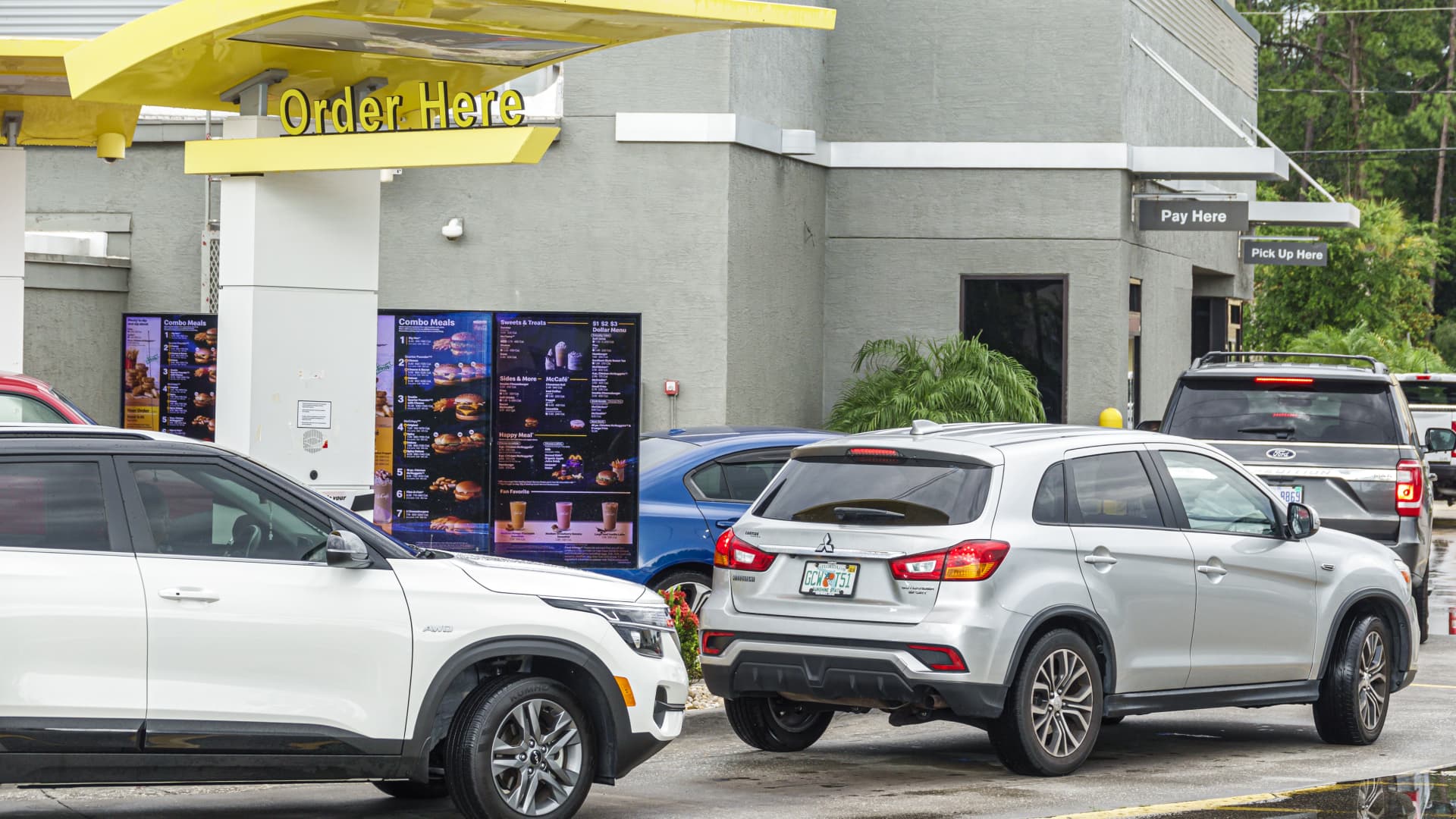Wall Street is figuring out what to do about McDonald’s as the stock takes a hit following the fast-food giant’s reported E. coli outbreak. The Centers for Disease Control and Prevention said Wednesday that McDonald’s Quarter Pounder hamburger has been tied to 10 hospitalizations and one death. McDonald’s said an initial investigation showed some of the cases could be from its slivered onions, which are sourced from a single supplier. McDonald’s has told all local restaurants to remove slivered onions from their supply and has stopped offering the Quarter Pounder temporarily in several Western states, including Colorado, Kansas and Utah. Shares of the Chicago-based chain dropped more than 6% in early trading Wednesday. MCD 1D mountain McDonald’s, 1-day With this information, multiple analysts drew comparisons between McDonald’s predicament and an E.coli outbreak connected to Wendy’s lettuce in 2022. That’s considered a better situation than what Chipotle saw with multiple foodborne illnesses affecting the Mexican fast-casual restaurant for several years in the 2010s. “Food safety headlines are obviously a negative,” said Deutsche Bank analyst Lauren Silberman. But, “assuming the outbreak is an isolated and identified supply-chain issue, the incident appears to more closely resemble WEN’s isolated E. coli outbreak in 2022 linked to its supply chain rather than CMG’s multiple foodborne illnesses in 2015 where issues were more systemic.” UBS analyst Dennis Geiger drew the same conclusion, calling the outbreak “more contained thus far.” He said McDonald’s should limit “further damage” by handling the situation proactively. Still, restaurants that have seen these types of outbreaks have typically felt some pain on their stock. Barclays said Chipotle shares dove more than 35% from early 2015 to the end of 2018. Meanwhile, the S & P 500 jumped about 22% in that same time period. Shares of Jack in the Box , which had a well-known outbreak in the early 1990s, also tumbled more than 35% from early 1992 to the end of 1993, per Barclays data. By comparison, the S & P 500 rose around 15% in that period. But the firm also found that these stocks have been able to bounce back in a big way. Chipotle shares have rallied around 1,100% from their bottom in February 2018, while Jack in the Box has soared more than 2,500% when compared against a 1995 low point. “We … expect MCD shares to underperform near-term. With that said, using history as a guide, time will likely heal these wounds,” Barclays analyst Jeffrey Bernstein wrote in a note to clients. “As seen with the historical record at JACK & CMG, the immediate damage to a brand can be severe, although ultimately overcome.” Bernstein was one of several analysts mentioning social media as a variable in how the McDonald’s outbreak is perceived by the public. He said the company’s earnings report scheduled for next week offers the chance to mitigate concerns. Media scrutiny, along with the breadth of issues, contributed to an “anemic” recovery in Chipotle’s same-store sales growth following its ordeal, according to Bank of America. On the other hand, analyst Sara Senatore called the impact to Wendy’s from its outbreak “fleeting,” underscoring the vastly different outcomes for restaurant companies in this situation. Based on historical trends and the current information available, Gordon Haskett analyst Jeff Farmer estimated McDonald’s same-store sales will likely decline at a medium to high single-digit percentage pace this week and next week. Citi, meanwhile, said the news should hurt both McDonald’s stock and its comparable figures. Analyst Jon Tower listed Wendy’s and Jack in the Box, along with Burger King parent Restaurant Brands and Taco Bell parent Yum Brands , as stocks that can benefit from McDonald’s troubles. Analysts evaluate stock Several analysts recommended the stock despite the news, with some going so far as to call this drawdown a time to buy. “We know we are going to be asked a direct question here so we will answer it — with the stock down ~6% we are buyers of MCD,” JPMorgan’s John Ivankoe wrote to clients. Wells Fargo analyst Zachary Fadem made a similar declaration, citing Wendy’s as “precedence for a sharp recovery in shares.” He noted that Wendy’s underlying business did not see impacts from the outbreak, pointing specifically to the fact that domestic comparable sales accelerated in the final two quarters of 2022. “We stay OW via beatable 2H expectations and confidence that MCD’s supply chain is sophisticated enough to identify/resolve this quickly,” Fadem wrote in a note. “Thus, we see a buying [opportunity], but acknowledge it could take time.” Others aren’t so confident. Baird analyst David Tarantino lowered his rating on McDonald’s to neutral from outperform in the wake of the outbreak. He said it adds to concerns around the economic backdrop as a whole for the fast-food stock. “We are concerned that reports of an E. coli outbreak linked to McDonald’s restaurants in multiple U.S. states could pose a major threat to consumer sentiment and MCD’s U.S. comps,” he said. “With uncertainty now creeping in across all segments, we find difficulty calling for near-term upside for the shares.” Guggenheim analyst Gregory Francfort moved to neutral from buy, saying the outbreak creates a “wide range of uncertainty.” “With 3Q24 U.S. sales momentum, MCD was shaping up to be one of the few restaurants with a clear line of sight into a beat and raise cycle for 2025,” Francfort said. “But media attention on a food safety issue announced yesterday after market close adds risk and with shares down only mid-single digits in post market trading, we worry that those risks are not being accurately reflected in the initial reaction.” “We think McDonald’s has compelling business moats in the U.S. business that keep the long-term story on track,” he added. “But we’re concerned that near-term sales challenges may now cause downward pressure on shares.”





